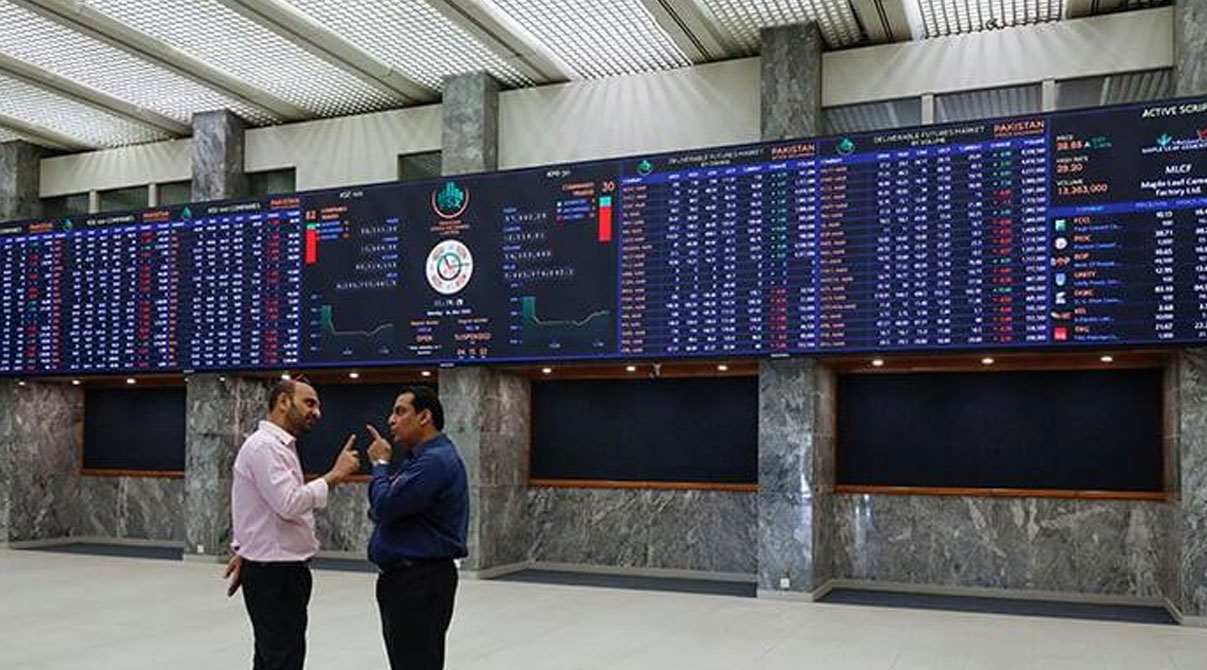The Pakistan Stock Exchange (PSX) is the principal stock exchange in Pakistan, providing a platform where investors can buy, sell, and trade shares of publicly listed companies. Established in 2016, PSX came into existence through the amalgamation of the Lahore, Karachi, and Islamabad stock exchanges. It offers a transparent and efficient venue for investing in the corporate sector, allowing individuals to participate actively in the financial market.
Investing in the stock exchange is crucial for both individuals and the broader economy. For individuals, the stock market offers an opportunity for wealth growth, as it allows for capitalizing on the market gains made by listed companies. Investors can also generate income through dividends, receiving a portion of the profits that these companies make. Strategic and informed investing in stocks can lead to financial security and independence, providing individuals with financial stability and the means to achieve their financial goals.
The primary purpose of this article is to serve as a comprehensive guide for those interested in investing in the Pakistan Stock Exchange. Whether you are a beginner or an experienced investor, this article is designed to provide you with the essential knowledge and insights needed to navigate the PSX effectively. This guide aims to empower you to make informed and confident investment decisions in the PSX, demystifying the process of stock investment for everyone.
Understanding the Pakistan Stock Exchange

The Pakistan Stock Exchange (PSX) has its roots in the establishment of the Karachi Stock Exchange (KSE) in 1947, shortly after Pakistan gained independence. Over the years, other regional exchanges were founded in Lahore and Islamabad. In 2016, in a bid to streamline operations and provide more robust trading platforms, these three exchanges were consolidated to form the PSX.
This union aimed to foster a stronger capital market while ensuring that resources were efficiently utilized. Since its inception, PSX has witnessed various market phases, including bull and bear markets, reflecting the economic conditions and political stability of the country.
Market Structure of PSX

The PSX operates with a market structure designed to facilitate investors, brokers, and listed companies efficiently. It comprises the:
- Main Board: For large-cap companies, this board is the primary market segment where most of the trading activity occurs.
- Small and Medium Enterprises (SME) Board: This segment caters to smaller companies looking to raise capital. It has more lenient listing requirements to encourage SMEs to participate in the market.
- Futures Market: Investors can trade in futures contracts of different financial instruments, providing a mechanism for price discovery and risk management.
- Over-the-Counter (OTC) Market: This segment is for securities not listed on the main boards, allowing trading of less liquid assets.
Regulatory Framework
Navigating through the stock market requires a comprehensive awareness of the regulatory framework that governs the market. This framework ensures that the market operates transparently, efficiently, and fairly, providing protection to investors.
Role of The Securities and Exchange Commission of Pakistan (SECP)
The SECP serves as the principal regulatory body for the capital markets in Pakistan, including the stock market. Its role is pivotal in fostering a climate of transparency and accountability in the market. The SECP formulates policies and regulations, supervises market participants, and conducts investigations and enforcement actions when necessary. Its mandate includes protecting investors from fraudulent practices, ensuring fair treatment of investors, and promoting informed investment decisions through mandatory disclosures by listed companies.
PSX Regulations and Compliance Requirements
The Pakistan Stock Exchange (PSX) operates under a set of stringent regulations and compliance requirements designed to maintain market integrity and protect investors. These include:
- Listing Regulations: Companies wishing to list on the PSX must adhere to specific financial, governance, and disclosure standards. These regulations ensure that only credible and financially sound companies participate in the market.
- Trading Regulations: PSX has established trading rules to facilitate fair and orderly trading. These rules cover aspects like trading hours, trading mechanisms, and the handling of trading disputes.
- Brokerage Compliance: Brokers and brokerage firms must comply with the regulatory standards set by both the SECP and PSX. These standards pertain to capital adequacy, risk management, and client dealings, ensuring that brokers operate ethically and responsibly.
- Investor Protection: PSX has mechanisms in place to safeguard investor interests, including an investor protection fund and a surveillance system to monitor market activities for any irregularities.
Investor Rights and Protections
Investors in the Pakistan Stock Exchange enjoy a set of rights and protections designed to foster confidence in market participation. Investors have the right to access accurate and timely information about listed companies, allowing them to make informed investment decisions.
Regulatory bodies actively monitor the market to prevent and penalize fraudulent activities, providing a secure environment for investors. In case of disputes or grievances, investors have access to resolution mechanisms through the SECP and PSX, ensuring that their concerns are addressed effectively and fairly.
Market Indexes in PSX

Indexes in the PSX serve as benchmarks reflecting the market’s overall performance and helping investors understand market trends. Some of the key indexes include:
- KSE-100 Index: The most prominent index, representing the top 100 companies listed on the PSX based on market capitalization. It provides a comprehensive overview of the market’s performance.
- KSE-30 Index: This index comprises the 30 largest companies in terms of trading volume and market capitalization, offering a snapshot of the market’s activity.
- All Share Index: Representing all listed companies, this index provides the broadest view of the market’s performance, encompassing various sectors.
- KMI 30 Index: Designed for Shariah-compliant investors, this index includes 30 vetted companies adhering to Islamic financial principles, aligning investments with religious and ethical beliefs.
Major Companies Listed on PSX

Pakistan Stock Exchange is home to some of Pakistan’s leading corporations spanning various sectors. Spanning diverse sectors from technology to energy, healthcare to finance, these corporations play a pivotal role in shaping Pakistan’s economic landscape. With a rich tapestry of enterprises, the PSX offers investors a platform to participate in the growth and development of some of the most prominent names in the country. Some noteworthy companies include:
- HBL Asset Management: One of the largest banks in Pakistan, offering a wide range of financial services.
- Engro Corporation: A diversified corporation involved in sectors like fertilizers, foods, chemical storage, and energy.
- Millat Tractors: The leading manufacturer of tractors in Pakistan, playing a pivotal role in mechanizing the country’s agriculture sector.
- Oil & Gas Development Company (OGDC): The flagship national oil company engaged in exploration, drilling, and production of crude oil and natural gas.
- Fauji Fertilizer Company Ltd. (FFC): A leading producer of fertilizers, FFC plays a crucial role in Pakistan’s agricultural sector, providing farmers with essential nutrients for their crops.
- TRG Pakistan Ltd.: A technology-focused investment holding company, TRG Pakistan Ltd. invests in the tech sector globally, fostering innovation and technological advancement.
- Unilever Pakistan Foods Ltd.: A subsidiary of the global consumer goods giant Unilever, this company offers a wide range of food products, meeting the daily needs of consumers across Pakistan.
- Nestle Pakistan Ltd.: As part of the global Nestle group, Nestle Pakistan Ltd. provides consumers with a variety of food and beverage products, promoting health and wellness.
- Colgate Palmolive (Pak) Ltd.: Engaged in the manufacturing and sale of detergents, personal hygiene, and food products, Colgate Palmolive serves as a household name in Pakistan.
- Standard Chartered Bank Pakistan Ltd.: Offering a comprehensive range of banking and financial services, Standard Chartered Bank Pakistan Ltd. is a key player in the country’s financial sector.
Stocks in PSX

Stocks, in the context of the Pakistan Stock Exchange (PSX), represent ownership shares in publicly-listed companies. When you own a stock, you essentially own a portion of that company. These ownership shares are also known as “equities” or “equity securities.”
Investing in stocks involves purchasing shares of a company, making you a shareholder. As a shareholder, you have certain rights, such as the right to vote on company matters (in the case of common stocks) and the right to receive a portion of the company’s profits (in the form of dividends).
Taxation Framework and Fee Structure

Understanding the tax implications and various fees associated with stock market investments is crucial for investors as these charges directly impact the returns on investment. In Pakistan, the taxation framework and fee structure for stock market transactions are well-defined, and investors should be aware of these to navigate efficiently.
Taxation on Stock Market Earnings
Earnings from the stock market in Pakistan are subject to taxation, and the rates vary depending on the type of earnings and the duration for which the stocks are held.
Capital Gains Tax (CGT)
Capital gains derived from the sale of shares are taxable. The tax rate depends on the holding period of the stocks. For stocks held for a shorter duration, the capital gains tax rate is higher, while it is lower for stocks held over the long term.
Dividend Income Tax
Dividends in the Pakistan Stock Exchange market received from shares are also subject to tax. The rate of tax on dividend income varies based on the type of company distributing the dividends. For example, dividends from companies in the banking sector might be taxed at a different rate than those from other sectors.
Withholding Tax
Investors should also be aware of the withholding tax that applies to various transactions and earnings from the stock market. Investors are advised to consult tax professionals or refer to the latest tax laws for accurate and current tax rates and implications.
Brokerage Fees and Charges
Brokerage fees are the charges that brokers levy for executing transactions on behalf of investors. These fees can vary significantly from broker to broker, and investors should be aware of them.
Brokers charge a commission, which is a percentage of the trade value, for buying and selling stocks on behalf of investors. The commission rates are often negotiable, especially for active traders. Some brokers may charge fees for maintaining trading accounts, providing research, and other services.
In addition to commissions, investors may incur other transaction-related costs, including fees for order modifications and cancellations. Apart from the taxes on earnings and brokerage fees, investors might also incur additional taxes and duties:
- Capital Value Tax (CVT): CVT is levied on the purchase of shares, and the rate may vary.
- Stamp Duty: A nominal stamp duty is applicable to both the purchase and sale of shares.
- SECP Fees: The Securities and Exchange Commission of Pakistan (SECP) also imposes a regulatory fee on stock market transactions.
Top 5 Pre-Investment Considerations

Before diving into the world of stock investment, it’s imperative to consider various factors that significantly influence the market. Understanding these elements will not only guide you in making informed decisions but also help in devising a strategy that aligns with your financial objectives and risk appetite.
1. Economic Conditions and Stock Market Performance
Economic conditions serve as the backbone of stock market performance in Pakistan Stock Exchange. The overall health of the economy is often mirrored in the stock market. Factors such as GDP growth, interest rates, inflation, unemployment rates, and consumer spending power collectively influence the market.
For instance, a thriving economy usually sees a bullish stock market, as companies report higher earnings due to increased consumer spending, leading to higher stock prices. Conversely, economic downturns often result in bear markets. Therefore, investors must keep a pulse on the economic indicators to anticipate market movements and make informed investment decisions.
2. Importance of Political Stability for PSX
Political stability is a key for a thriving stock market. A stable political environment fosters business confidence, leading to increased investments and economic growth. It provides predictability, allowing companies to plan and invest for the long term, which, in turn, positively impacts their stock prices.
On the other hand, political turmoil or uncertainty can lead to market volatility, as investors become wary of the changing policies and their implications on corporate earnings and economic growth. Hence, considering the political climate is crucial when investing in stocks.
3. Analyzing Market Trends and Performance
Market analysis is a vital pre-investment exercise in the Pakistan Stock Exchange. It involves studying past market behaviors, current market trends, and making future predictions. Two primary analysis methods are:
Technical analysis of the market involves studying price patterns and market trends through charts and statistical measures. It helps in identifying trading opportunities based on historical data and market psychology. In fundamental analysis investors evaluate a company’s intrinsic value by examining financial statements, management quality, market share, and industry trends. This method is essential for investors looking to hold stocks for the long term. Understanding these analysis techniques will empower investors to make decisions that align with market movements, maximizing their investment returns.
4. Assessing Investment Goals and Risk Tolerance
Before investing, it’s crucial to define your investment goals and understand your risk tolerance. Investment goals vary from individual to individual; while some invest for short-term gains, others might be looking at long-term wealth accumulation.
Knowing your objectives will guide your investment strategy, helping you select stocks that align with your financial goals. Risk tolerance, on the other hand, refers to your ability and willingness to endure market volatility. Assessing your risk tolerance will guide you in creating a portfolio that you’re comfortable with, preventing hasty decisions during market fluctuations.
5. Investment Strategies for Stock Selection

Selecting the right stocks is a crucial step in building a successful investment portfolio. Investment strategies provide a roadmap for investors, guiding them on how to approach their investment decisions to align with their financial goals and risk tolerance before purchasing stocks. Before selecting PSX stocks for your investment portfolio, there are several crucial factors to consider:
Fundamental Analysis of Stocks
Fundamental analysis is an approach employed by investors to assess the inherent value of a stock. This approach involves examining various financial and economic factors related to a company and the overall market. Investors scrutinize a company’s financial statements, including income statements, balance sheets, and cash flow statements, to assess its financial health.
Additionally, fundamental analysis considers external factors like industry trends, economic indicators, and the regulatory environment. By understanding a company’s true value and comparing it to its current market price, investors can make informed decisions on whether a stock is undervalued or overvalued.
Technical Analysis of Stocks
Technical analysis, on the other hand, focuses on fluctuations in stock prices and their trading volumes. This strategy relies on graphical charts and statistical metrics to discern market patterns and trends. Technical analysts believe that historical price movements and trading volumes are indicative of future market trends. To forecast stock prices and facilitate informed trading decisions, they deploy an array of charting utilities and technical indicators, including but not limited to moving averages and the Relative Strength Index (RSI).
Diversification Strategy for Minimizing Risks
Diversification is a risk management strategy or technique where investments are dispersed among multiple assets or asset categories to reduce exposure to any single investment. The rationale behind diversification is that different investments respond differently to Pakistan Stock Exchange market conditions.
Investing in any financial market involves a certain level of risk. Being aware of these risks is crucial for making informed decisions and managing your PSX investment portfolio effectively. Here are some of the key types of investment risks you should be mindful of:
- Market Risk: Also known as systematic risk, market risk is unavoidable and affects the entire market. It stems from macroeconomic factors like inflation rates, interest rates, and geopolitical events.
- Credit Risk: This risk arises when a company is unable to fulfill its financial obligations, impacting its stock value. It’s crucial for investors to assess a company’s creditworthiness before investing.
- Liquidity Risk: Liquidity risk pertains to the ease with which stocks can be bought or sold in the market without affecting their price. Stocks with low liquidity can be risky as they might be difficult to sell at market value.
- Operational Risk: Operational risk is associated with the internal failures of a company, such as mismanagement, fraud, or a breakdown in internal processes.
By holding a diversified portfolio, you can mitigate losses in one asset with gains in another, providing a level of protection against market volatility and uncertainties. Diversification does not eliminate risk entirely but helps in achieving a balance between risk and return.
Long-Term vs Short-Term Investment Strategies
Whether you are a long-term investor or a day trader, being aware of these strategies and knowing when to apply them will enhance your ability to navigate the market effectively and achieve your investment goals.
Long-Term Investment
Long-term investment strategies involve holding assets for an extended period, often years or decades. This approach is based on the belief that despite short-term market fluctuations, the value of assets will increase over time. Long-term investors often rely on fundamental analysis to select stocks with strong growth potential.
Short-Term Investment
Short-term strategies, conversely, thrive on swift market shifts in Pakistan Stock Exchange. Investors of this method often engage in frequent buying and selling of assets, leveraging minor price fluctuations. Short-term investing heavily relies on technical analysis, enabling traders to anticipate price shifts and execute timely actions.
How to Invest in Pakistan Stock Exchange?

Embarking on your investment journey in the Pakistan Stock Exchange requires initial steps to set up the necessary tools and accounts for trading. This section will guide you through the sequential process of investing in the Pakistan Stock Exchange market.
Requirements
Pakistani residents and non-residents can open a trading account. You must be at least 18 years old, possess a valid Computerized National Identity Card (CNIC) or National Identity Card for Overseas Pakistanis (NICOP), a Bank Account, a recent photograph, proof of residence and have a National Tax Number (NTN).
Shortlist Reputable Brokerage Firms
Navigating the PSX begins with choosing a reputable brokerage firm. Begin by compiling a list of registered and licensed firms that align with your preferences. Consider factors such as their reputation, commission rates, available services, and customer feedback. This research will serve as the basis for your final selection.
Select the Ideal Brokerage Firm
Choosing a broker is a crucial decision as they will be your gateway to the market. Look for registered brokers with the Pakistan Stock Exchange and the Securities and Exchange Commission of Pakistan (SECP). Consider their brokerage fees, services offered, trading platform, customer service, and market reputation. It’s advisable to select a broker whose services align with your investment goals and preferences.
Opening the Essential Accounts
Once you’ve selected a broker, you need to complete the account opening form, either online or in person. After submission of necessary documents, the broker will conduct a verification process, and upon successful verification, he’ll establish these Pakistan Stock Exchange trading accounts.
Brokerage Account
The brokerage account serves as your primary platform for executing trades. It’s where you’ll place buy and sell orders for stocks. Ensure you provide all required documentation accurately to complete the account opening process.
CDC Sub Account
Managed by the Central Depository Company (CDC), the CDC Sub Account acts as a secure repository for your securities. It ensures that your shares are held in a transparent and protected environment, safeguarding them from external risks.
CDC Investor Account
The CDC Investor Account allows direct access to the CDC’s services, providing you with control over your holdings. This account is crucial for keeping track of your investments and managing your portfolio effectively.
Depositing Funds for Trading

Once your accounts are established, it’s time to inject capital into your brokerage account. This serves as the financial foundation for your trades. While various methods may be available, one secure option is depositing funds through cheques. Follow the specific instructions provided by your chosen brokerage firm to ensure a seamless process.
Installation of PSX Mobile Trading Application
With the advent of smartphones, many brokers offer mobile trading apps, allowing investors to trade on the go. These apps provide a user-friendly interface for investors to execute trades, monitor their portfolios, and analyze stocks. These platforms are accessible via web browsers or downloadable software, and they offer real-time market data, charting tools, and other analytical features. Notable apps for Pakistan Stock Exchange trading include:
- KTrade App: Provides a seamless trading experience with a range of features for portfolio management.
- UBL Funds Smart Savings App: Allows for easy investment in different mutual funds.
- KiTS Mobile App: Offers real-time trading with live market data and a range of analytical tools.
- Investify PSX Stocks Pakistan: A comprehensive app providing detailed financial analytics to help in making informed investment decisions.
- Al Meezan Investments: Ideal for investors looking to invest in Shariah-compliant mutual funds and investment plans.
- Sarmaaya Financials: A financial marketplace offering detailed insights, analytics, and a trading platform for stocks and mutual funds.
- SCSTrade PRO: Provides professional trading tools, real-time stock prices, and live financial news to keep investors updated.
Making Your First Investment
After conducting thorough research and selecting suitable stocks, it’s time to make your first investment by purchasing stocks. This process involves engaging with the practical aspects of trading, which includes placing orders through your chosen brokerage platform. There are two types of orders that dictate the terms under which a trade is executed, each offering its own set of advantages and considerations. These include:
Market Orders
A market order is an instruction to buy or sell a stock at the best available price in the market. It’s executed immediately. While this ensures your order is filled quickly, keep in mind that the price may vary slightly from what you see at the time of placing the order. Market orders are typically used when you want to execute a trade promptly.
Limit Orders
A limit order allows you to specify the maximum price you’re willing to pay (in the case of a buy order) or the minimum price you’re willing to accept (in the case of a sell order). This provides more control over the price at which your order is executed. However, there’s no guarantee the order will be executed, especially if the Pakistan Stock Exchange market doesn’t reach your specified price.
Monitoring and Managing Your Portfolio

Effective portfolio management is a dynamic process that requires continuous attention and adjustment. Investors should not only focus on creating a robust initial portfolio but also commit to monitoring and managing it to align with their financial goals and market dynamics.
Setting Realistic Expectations
It’s crucial for investors to set realistic expectations regarding the returns on their PSX investments. Understanding that the stock market is unpredictable and volatile helps in establishing achievable goals. Having clear, realistic expectations also aids in making informed decisions without being swayed by market noise and short-term performance pressures.
Stop-Loss Orders
A stop-loss order is a precautionary measure to limit potential losses. It instructs your broker to sell a stock if its price falls to a certain level. This helps protect you from further declines in the value of the stock. Setting a stop-loss order is particularly important for managing risk, especially in volatile market conditions.
Rebalancing and Adjusting Investments
Over time, the original allocation of your portfolio may drift due to varying performances of different assets. Regular rebalancing is essential to maintain the desired asset allocation, which involves buying or selling stocks to restore your portfolio to its target allocation. This practice not only helps in securing profits but also in mitigating risks associated with overexposure to a particular asset or stock.
Position Sizing
Position sizing involves deciding the amount of capital to allocate to a particular stock or trade. A well-diversified portfolio helps to cushion against losses from underperforming assets in Pakistan Stock Exchange. It helps in preventing any single investment from causing a significant loss to the overall portfolio.
Regular Portfolio Reviews
Conducting regular reviews of your investment portfolio is vital. These reviews help in assessing the performance of individual assets and the portfolio as a whole. Regular evaluations provide insights into whether your investments are on track to meet your financial objectives, facilitating timely adjustments if necessary.
Embracing a Long-Term Perspective
Investing in the stock market requires patience and a long-term perspective. Short-term market fluctuations are inevitable, but it’s important to stay focused on long-term investment goals. A long-term view also supports the practice of buy-and-hold investing, which has proven to be successful for many investors over time.
Implementing Tax-Efficient Strategies
Tax efficiency is a critical aspect of successful investment management. Implementing strategies that minimize tax liabilities can significantly enhance net returns on investments. This might involve investing in tax-advantaged accounts, holding investments for the required period to qualify for lower capital gains tax rates, and strategically realizing losses to offset gains.
Common Mistakes to Avoid

Investing in the Pakistan Stock Exchange market can be a lucrative venture, but it also comes with its set of challenges and risks. Often, investors, especially those new to the market, make mistakes that can significantly hinder their investment performance. Being aware of and avoiding these common errors is crucial for investment success.
Insufficient Research and Planning
Jumping into investments without adequate research and planning is akin to navigating through unknown territory without a map. Lack of research can lead to poor investment choices, resulting in financial losses. Investors might end up putting money into stocks of companies that are not financially stable or have bleak future prospects.
Always conduct thorough research before making investment decisions. Understand the financial health, performance history, and future prospects of the companies you wish to invest in. Developing a well-thought-out investment plan that aligns with your financial goals and risk tolerance is also vital.
Ignoring Market Trends
Market trends provide valuable insights into the possible future movement of stock prices. Ignoring these trends can result in missed opportunities for profit or unexpected losses. Investors who disregard market trends might buy stocks at inflated prices or sell them when the prices are low.
Stay updated on market trends and economic indicators. Utilize technical analysis to understand price movements and make informed trading decisions. Being aware of both macro and micro-economic factors that influence the stock market is essential.
Poor Risk Management
Without effective risk management strategies, investors expose themselves to significant financial losses in the Pakistan stock exchange market. Poor risk management might lead to investing too much capital into a single stock or not diversifying the investment portfolio adequately.
Implement robust risk management practices, including diversification, setting stop-loss orders, and proper position sizing. Understand your risk tolerance and invest accordingly to avoid financial strain in case of losses.
Chasing Losses
Chasing losses refers to the practice of trying to recover losses by making increasingly risky investments. This approach often leads to a vicious cycle of loss and desperation, ultimately resulting in substantial financial damage.
Accept that losses are an inherent part of investing. Instead of trying to recover losses hastily, reassess your investment strategy and make rational, well-informed decisions. Avoid making impulsive trades driven by emotions.
The Bottom Line

Investing in the Pakistan Stock Exchange (PSX) is a promising avenue for wealth accumulation, offering opportunities for both novice and seasoned investors. The journey begins with acquiring a foundational understanding of the PSX, including its history, structure, key indices, and prominent listed companies. Prior to making investment decisions, it’s imperative to consider various factors including the prevailing economic conditions, political stability, market trends, and one’s investment goals and risk tolerance.
In conclusion, while the stock market presents challenges, responsible and informed investing can help individuals navigate these effectively, unlocking the potential for substantial financial gains through the PSX. With a clear, well-informed strategy and a cautious approach, investors are better positioned to achieve their financial objectives in the stock market. Happy investing!